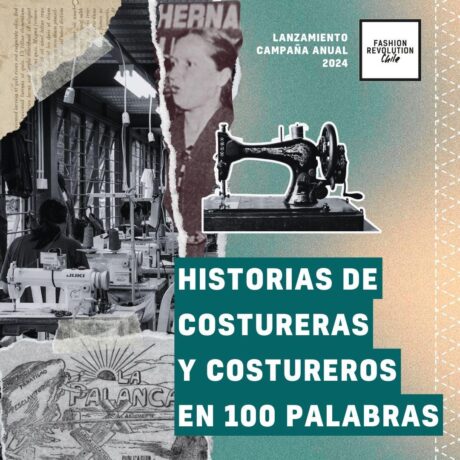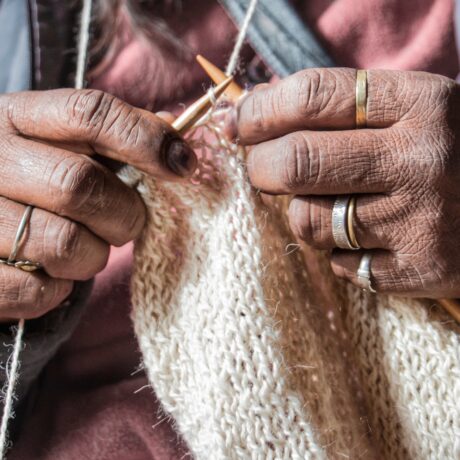Unions Are Important: the Factory Owners Listen to Us
My name is Jessmin Begum, I am 31 years old and I have been working in the garment industry for 15 years.
I have worked in six different factories in total. In those 15 years, I have seen many different labels. I have manufactured clothes for brands such as H&M, Gap, Walmart, S.Oliver, C&A, Zara. I first started working in the garment sector after completing my Higher Standard Certificate of education. A neighbour told me about a job in a garment factory; so I joined. In my first job I was a ‘helper’. That means I was cutting the threads from the seams of the clothing. I did that job for a month and then I was promoted to a seamstress. I worked in that factory for one year. Then I got a job at another factory where the salary was higher. I worked in that factory for the next nine years and earned 7700 Taka (85€/£62/$96) including overtime.
That factory was in an Export Processing Zone (EPZ). In the EPZ, a different labour law applies. The Government regulates it through an authority called BEBZA (Bangladesh Export Processing Zones Authority). My first job had been outside EPZ. You can tell the difference. They pay wages in a timely manner on the seventh day of the following month, they give regular weekend breaks and holiday pay.
The government ruled that each factory in the EPZ should have a Workers’ Welfare Committee. When it came to the election for that committee, my friends encouraged me to run. They made posters and banners. The committee is comprised of 12 members. When it came to the election of the chair, the other eleven didn’t want to take on that role, so I did it. The committee is elected every two years and I was re-elected twice.
My duty as chair was to meet with BEBZA. Sometimes they came to the factory, which meant I had to leave my work and go to meet them at the General Manager’s office.
The factory owner put me under pressure.
In order to make a good impression, the factory owners told the Authority that they could speak to me at any time. However, I was pressurised not to go by the factory owner, the middle management, my line manager and supervisors. So I asked the people at the BEBZA why they called on me during working hours as my manager did not want me to leave my work.
Before I explain what happened, I would like to tell you a bit more about the factory
The factory had five floors and on each floor there were 400-500 people, around 2500 workers in the building, out of which there were just 12 committee members appointed. We were all working on different floors and in different jobs. During lunch break, we would sit together and discuss peoples’ complaints. We gathered information. When BEBZA came, sometimes we all went to see them, but often I went alone to pass on the complaints.
I was the one who was speaking out.
The others didn’t do that as much. BEBZA used to listen to me. They usually came two to three times a year as a routine check up, and when the workers were protesting.
So, as I said, the factory owner pressured me not to leave work in order to go to these meetings. When the time came for the meeting, they would give me more work. If I normally had to complete 10 garments, they now gave me 15, which would be impossible to finish. So sometimes I couldn’t attend the meetings. If there were no committee representatives who could attend the meetings with BEBZA, they asked the factory owner to send other employees, so he would send a supervisor or one of his relatives.
Whenever I had the opportunity to pass on the workers’ complaints, BEBZA said they would look into the problem. But there was no action. No solution. The law in Bangladesh stipulates working hours from 8am to 5pm, with two hours of overtime from 5pm to 7pm. But the owner pressurised us to work four or five hours of overtime. But you know, we can’t go home every day at 10pm. First of all, there is a security issue for women. Then, when we go home, we still have to cook. At that time I was living with my mother. I was single and my mother cooked for me. But other workers needed to do all that alone, they had to take care of their children and they also had to sleep.
The Authority did not respond to our complaints. There was no action.
So the workers gathered together and wrote the following demands: higher wages, no more than two hours of overtime per day, no insults while working, no beatings and, most importantly, no termination of our employment because of the strike. The last point was particularly important to us, because otherwise they could just fire us.
As the chair, I had a certain amount of power. There were 2500 workers supporting me. The first strike was on 9 February 2003. We told the management and the police that we would continue our strike and our attacks if they did not meet our demands. So they signed.
During my time as chair, we held four protests in total. After the first protest they couldn’t fire me anymore, so they looked for other ways to get rid of me. I was bribed with 200,000 Taka (2200€/£1650/$2570) by the factory owner. He teased me, gave me a bundle of money and said sarcastically:
“Girl, you don’t know how much money is in here. Just take it and go.”
They wanted me to leave the factory because I talked too much. They knew that I had influence. They knew the risk. They knew that if I went to the Authority, they would listen to me. I did not accept the money.
During the last strike, I was four months pregnant. One day I was injured by brick which I blocked from hitting my body with my hand. Workers were throwing bricks inside the factory and the police were throwing them threw back. I finally stopped working at the factory when I gave birth to my baby because I had to breastfeed. I couldn’t be fired when I was pregnant of course, but I resigned because of the baby.
Afterwards I worked in another factory outside of the EPZ for one and a half years where I wasn’t paid on time. I joined the National Garment Workers Federation in 2008 where I work part-time as the Secretary for Women’s Affairs. Now I am in the NGWF I am letting people know about the law and their rights.
I go out on the road a lot and visit workers in their homes. I also work in a factory as a production reporter where I earn 15.000 Taka. At least if I lose my job at the factory, I will still have the job at NGWF .
Unions are important because they encourage the factory owners to listen to us.
If the owner has a tight shipping deadline, he will talk to the union members and say “can you help me out, can you work two more hours” and they will accept. So the conversation begins.
 Translated from the original interview in German by Anna Holl which appeared in N21
Translated from the original interview in German by Anna Holl which appeared in N21







